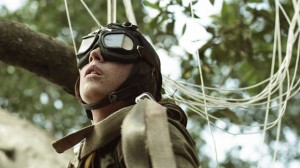On Tuesday I went to see a movie that was having its “World Premiere” at TIFF. Right there in those two words, “World Premiere,” is written the essence of the Toronto International Film Festival. It’s grandiose, almost lewd in ambition, and everything feels like it must be bigger, better and more important than you are. This, of course, is the way that celebrity—the radiating heart of this 11-day Godzilla stomp through the city—functions. If we didn’t all, deep down, want to be included, to be invited to that party where we might, I don’t know, touch the face of Julia Roberts or something, it just wouldn’t work. The festival shows us the space between “us” and “them,” and then invites us to fill that space, and each year we come charging, hoping to be a part of that beautiful, glittering fantasy unfolding before us.
And so for first-time director Aaron Wilson, who debuted his film Canopy at the festival, it must have been a validating and exciting experience. The movie has a very simple premise. An Australian pilot gets shot down while battling the Japanese over Singapore and improbably bonds with a Chinese soldier similarly trying to elude capture.
The central characters of this film—which is almost devoid of dialogue—aren’t really the actors playing the roles, but the jungle in which the story unfolds and the hyper-accented soundscape that surrounds them. Wilson is trying to do something different here, but in so doing Canopy comes across as more of a concept of a film than a film itself, an interesting idea in theory, but in practice maybe not so much.
It’s impossible to see this movie and not think of Terrence Malick’s The Thin Red line.
I don’t think that there’s a film on the planet that compares well to it, and Canopy is no exception. Although Canopy is beautiful to look at, it never establishes an emotional grip on the audience, relying too heavily on the mechanisms of filmmaking rather than the film itself. For instance, after a spell, the wordlessness of the movie becomes burdensome, a cinematic imposition rather than an organic necessity of circumstance and disparate languages. Clearly, the director wants us keenly focused on the canopy of sound covering the silent action, but he points us so intentionally in this direction it’s as if we’re following a neon-signs-lit detour route. The acoustics swiftly become a clumsy, almost naive contrivance that is master rather than servant to the film, pulling us away rather than in.
Perhaps if the actors were more expressive or physically compelling, the director’s reach wouldn’t have so exceeded his grasp. As it is, in spite of its lyrical flourishes and allusive passages, the movie has a constructed, almost humid weight. As we move from one poetic war trope to the next, as if in some theme park yet to be invented, Canopy does little more than ask you to like it.
When it ended, the near-full house applauded, as if in encouragement, it seemed, rather than appreciation. The director and his key people took the floor, ready for a Q & A, and the last amongst them to do so was the lead actor, Khan Chittenden. As is often the case, he was smaller and more vulnerable than you would have expected after having just seen him up there on the giant screen, and as he youthfully bounded down from his seat, he threw up an arm to the crowd, he too hoping for more than what was received.





Comments
2 responses to “On Going to a movie at TIFF”
Note to Self: re-rent The Thin Red Line. I remember marveling at it, but need to see it again…thanks!
Wish Canada made movies like this. Seen Pashendale?!